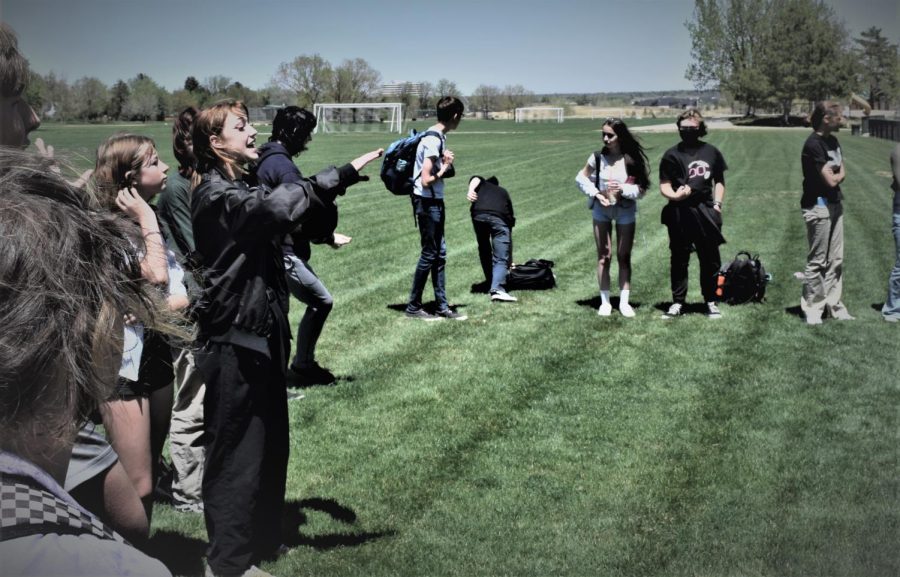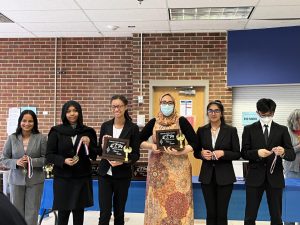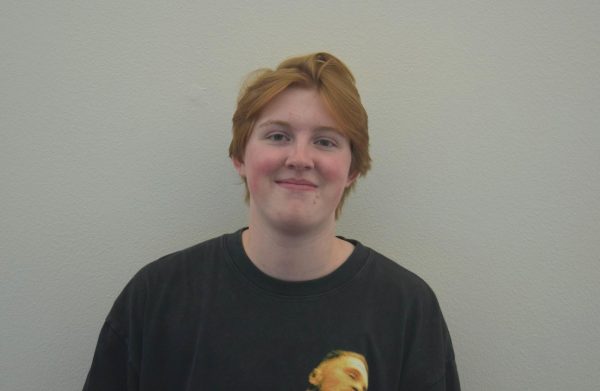Creek Students Take A Stance On Reproductive Rights
Sophomore Jaelynn Bourdeon gave a passionate speech at the student-led walkout protesting the possibility of Roe v. Wade being overturned on May 12. The protest was held in Greenwood Village Park and was organized by freshman River Sailers.
May 13, 2022
An estimated 886,000 people receive abortions per year, according to a United Nations model. That’s only the beginning of how many people could be affected by the overturning of Roe v. Wade.
On May 2, a leaked Supreme Court document surfaced. Written by Justice Samuel A. Alito Jr., the document contained his claims that Roe v. Wade, the decision that legalized abortion, was flawed from the beginning and only amplified debates over reproductive rights — and as such should be overturned.
“Roe was egregiously wrong from the start. Its reasoning was exceptionally weak, and the decision has had damaging consequences,” Alito wrote.
After the document was released alongside an analysis by Politico, people across the country feared that their lives would be forever altered if the original Roe decision was overturned by the Supreme Court.
About 64 million women and girls of reproductive age live in the United States, and every one of them could be affected by the overturning of Roe v Wade, but 33.6 million women live in states estimated to ban abortions if the decision is overturned in the coming months. Of that population, 58% of white women, 16% of black women, and 18% of Hispanic women would be at risk of losing their access to a safe abortion, according to the Guttmacher Institute.
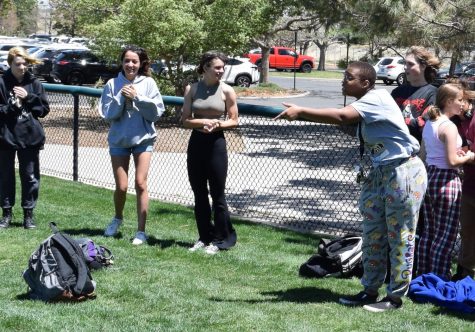
People of color are also more likely to need an abortion due to the higher numbers of sexual assault and rape cases that occur in the community.
“The majority of the people that are being sexually assaulted are people of color,” sophomore Naomi Johnson-Holman said. “People of color are being raped, sexually asaulted, abused, all of that.”
If Roe is overturned, abortions would not be made illegal everywhere. The decision to allow abortions legally would be up to state governments. Estimates say that more blue-leaning states would preserve access to abortions while more red-leaning states would ban them. Not only would this process make it more difficult to access an abortion, it would make it more dangerous too.
In September, an abortion ban passed in Texas led to a 10% decline in abortions given in the state, with some of those who needed the procedure either traveling out of state to receive care or ordering pills to terminate the fetus online. But widespread banning of abortion in the South if Roe were overturned would cause an even steeper decline in abortions. Most people seeking an abortion live on a lower income, and as such, travelling to across different states to find a legal clinic would be close to impossible.
Melissa Flournoy, a former Louisiana state legislator and women’s health advocate, agrees that the impact of overturning Roe would hurt lower class women more than anyone.
“Middle-income and wealthier women will always find a way, whether it’s traveling to another state or even another country,” Flournoy said in a New York Times interview. “The direct impact is going to be on mostly poor women who have no other options.”
And when it comes to having no other options, women will either choose to deliver a child they don’t want or can’t support, whether that’s financially or mentally, or have an abortion in a state where it’s illegal, increasing the chance of an unsafe procedure, which could lead to infection, disease, or death in some cases.
“The rich get to live superior lives while the lower class is left to the law,” Johnson-Holman said.
Estimates collected by the CDC from 2010-2014 show that 45% of all abortions are performed in unsafe conditions, with untrained persons and invasive methods used to abort the fetus.
A push for government protection of Roe v. Wade increased in the following days after the leak, bringing a bill to the Senate that would solidify Roe in federal law, protecting it from an overturning.
On May 11, the Senate blocked the bill with a majority vote of 51 to 49. The Democrats in the Senate would have had to achieve 60 votes to withhold the bill, but given the nearly 50-50 standings between parties in the Senate, that dream never became reality.
Since the document was leaked, Americans across the country have been quick to react. Protests began assembling outside of government buildings even on the day Alito’s statement became public.
Vice President Kamala Harris opened the vote on the Senate dais, giving a speech that included a symbolic display of White House support for the bill.
“This vote clearly suggests that the Senate is not where the majority of Americans are on this issue,” Harris said. “A priority for all that care about this issue — the priority — should be to elect pro-choice leaders.”
Even locally, people have begun to react to the news that they could soon lose their reproductive rights. On May 12, some Creek students staged a walk-out to Greenwood Village Park (GV) across the street. Organized primarily by freshman River Sailers, the walkout began abruptly at 12:15, just in the beginning of fifth period.
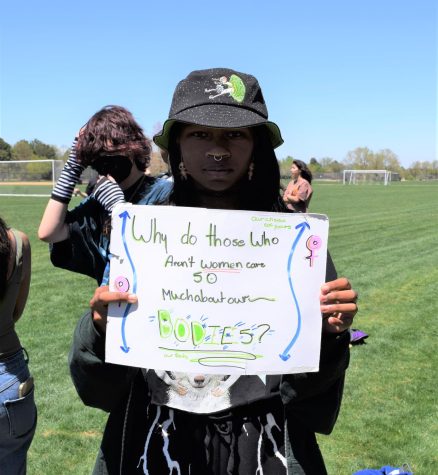
“I’m the one who organized most of the walkout, [and] I’m helping lead the whole discussion when we get to GV, [as well as] dealing with anyone that comes up to try to tell us to stop,” Sailers said. “I’ve done a lot of research on what to say and how to handle it peacefully.”
Sailers organized the protest with a passion for protecting Roe v. Wade, as well as spreading awareness through the walkout.
“The goal is to make ourselves heard,” Sailers said in an online interview. “Creek is a big school and if we do this, people will notice and hopefully start doing things themselves.”
People began filing out of their classrooms around 12:23, and after walking to GV, the crowd gathered around an open mic where anyone could discuss their thoughts on Roe.
Many Creek students protested the possibility of Roe being overturned, concerned about the harm that could come to their ability to receive an abortion, as well as wanting to protect the reproductive rights of everyone.
“Why are women being prosecuted for [a pregnancy] that happens between two parties?” Johnson-Holman said during the walkout.
The majority of Creek protested the possibility of Roe being overturned, concerned about the harm that could come to their ability to receive an abortion, as well as wanting to protect the reproductive rights of everyone.
“When I first saw [that Roe could be overturned] on my social media I thought it was a sick joke and I was genuinely disgusted when I took my time to thoroughly read and understand the circumstances and dangers of overturning Roe v. Wade, to not only women, but everyone who has the ability to conceive a child,” Freshman Kat Murphy said. “It’s a clear and pure validation of human rights. Banning abortion doesn’t prevent abortions, it just increases the chance of unsafe ones.”

